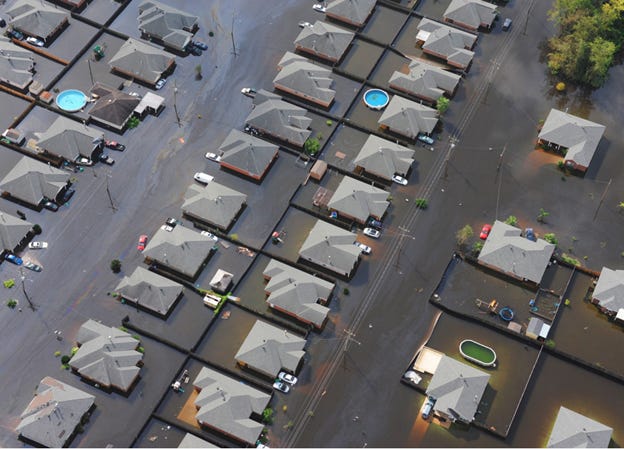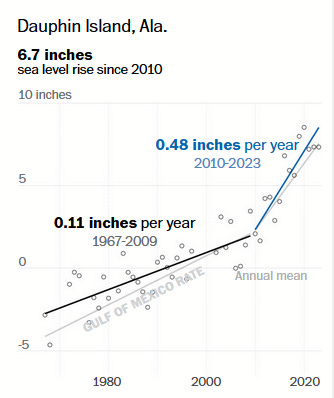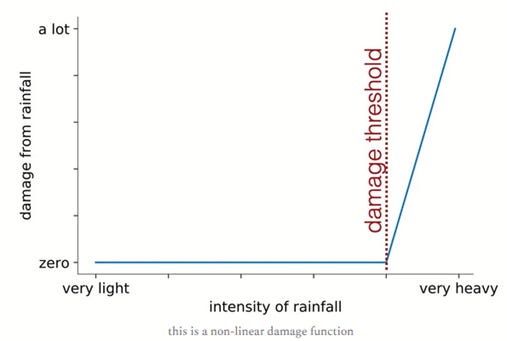Rising Seas Are a Problem Now, Not Later
Water flows downhill. Bad things happen when “downhill” gets higher.
Image: pxhere
Climate change is raising sea levels as oceans get warmer and polar ice caps melt. That’s not news. I’ve figured this was a longer-term problem, except for some unfortunate low-lying island nations. Waves are a few inches higher don’t really affect anyone yet.
This turns out to be wrong. Higher seas are a problem now, even in the US, and it’s worsening quickly.
Last month The Washington Post published a study of flooding along the US southern coast (see Part 1 and Part 2, unlocked). They pulled data from federal tide gauges and compared them with satellite data from the rest of the world.
The findings are pretty stark: sea level has been rising for decades and is rising even faster now. For example, at Dauphin Island, Alabama, the average sea level rose a total of 3.5 inches in the 30 years from 1980-2009. Then it rose another 6.7 inches in 2010-2023.
Chart: Washington Post
Some places are worse. At Galveston, Texas, sea level rose 14.5 inches in the last 43 years, with more than half of that occurring in the last 13 years.
If that rate continues – or accelerates even more – the next decade will bring greater problems than we thought. But it’s a problem right now, in particular during flood situations.
The rainwater dropped by big storms flows downhill, ultimately to the ocean. Once there, it can’t go any lower. As sea level rises, the flood water has less room to run, so it backs up and causes more damage. Scientists calculated flood volume in one 2023 incident was about 10% more than it would have been for an identical storm occurring in 1967.
Compounding the problem is that in some places, the land is also sinking. This is wreaking havoc on storm drains and other flood control systems. Scientists expect it to get even worse.
This means you don’t have to live on the coast to be vulnerable. Simply being near the coast (or any flood-prone area) will increasingly put you at risk.
In Jacksonville, Florida, a study by local authorities found more than a quarter of major roads could become unusable amid flooding. Residents in previously low-risk areas face much higher risks.
Inches matter, too. Dr. Andrew Dessler of Texas A&M explained it really well in a post last year. Quoting:
“If you’re struggling to understand why the impacts of climate change suddenly seem so awful, it’s time we discuss a key scientific term: non-linearity.
“In a linear system, changes occur in a straight line. If climate impacts were linear, each 0.1°C increase in temperature would produce the same increment of damage. In this world, things slowly get worse over decades until, later this century, the accumulations of slow impacts become truly terrible.
But impacts of climate change are different — they are non-linear. In a rain event, for example, the first few inches of rain typically produce no damage because existing infrastructure (e.g., storm drains) were designed to handle that much rain.
“As rainfall continues to intensify, however, it eventually exceeds the capacity of the storm runoff infrastructure and the neighborhood floods. You go from zero damage if the water stops half an inch below the front door of your house to tens of thousands of dollars of damage if the water rises one additional inch and flows into your house.
“Thus, the correct mental model is not one of impacts slowly getting worse over decades. Rather, the correct way to understand climate change is that things are fine until they’re not, at which point they’re really terrible. And the system can go from ‘fine’ to ‘terrible’ in the blink of an eye.”
Note, too, all this is a problem even without hurricanes or tropical storms. Those get more attention, but the myriad smaller-scale impacts may be a much greater threat over time.
Again, there’s no reason to think sea level will stop rising and many reasons to think it will rise a lot more. We aren’t reducing carbon emissions enough to stabilize air and sea temperatures.
All these problems will likely get worse before they get better. Prepare now.




